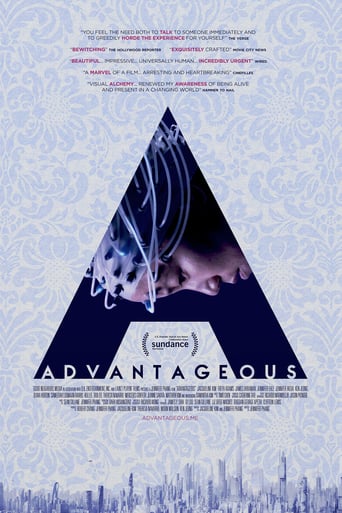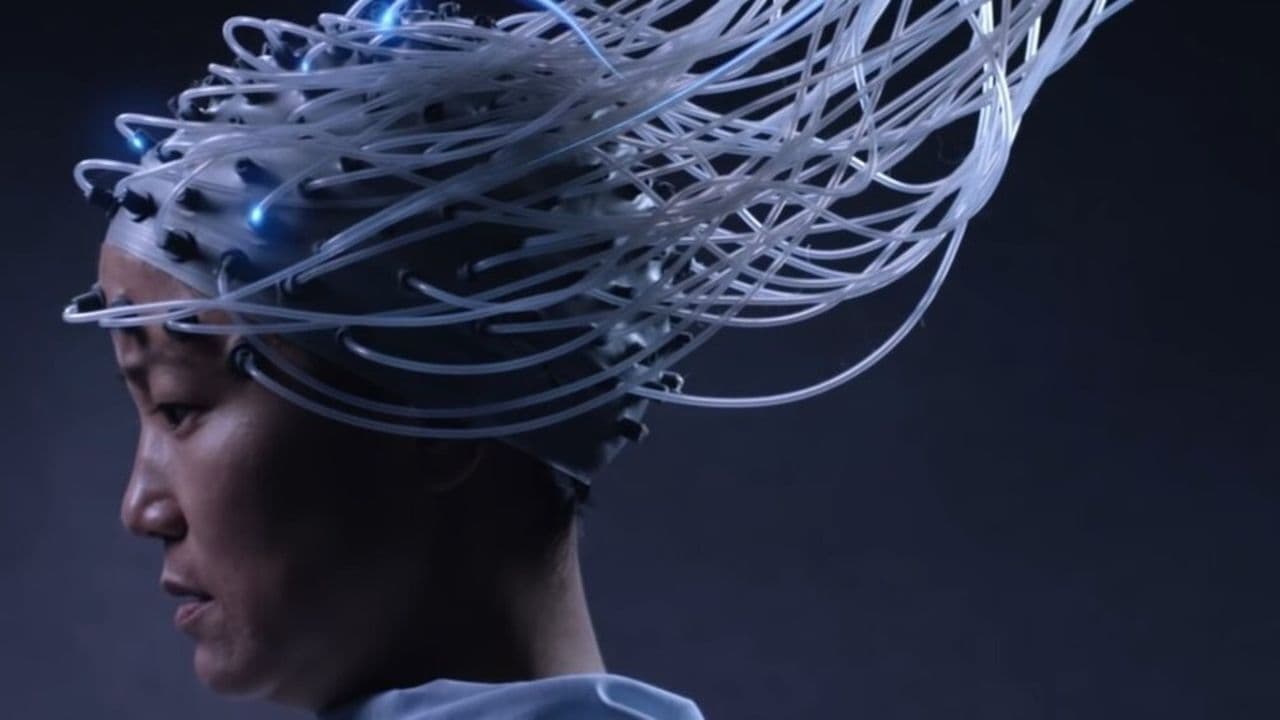Turfseer
Advantageous is the second feature by Jennifer Phang based on the screenwriter/director's award-winning short film of the same name. Set in an unspecified future, Advantageous' setting was described by one critic as a "feminist dystopia." The protagonist Gwen (played with great intensity by Jacqueline Kim) is a spokesperson for a biotech company, Center for Advanced Health and Living. When her superiors deem her too old to continue working in a job that demands a younger look, she's unceremoniously given the proverbial pink slip. The problem is that in the future not only are there virtually no jobs for older, middle-aged woman, but an economic recession has led men to be given preference in the marketplace (sound like someplace you know?) Gwen is faced with the crisis of not having enough funds to ensure that her teenage daughter, Jules (played by sensitive newcomer Samantha Kim) gets into an elite private school which will guarantee her upward mobility (the consequences of what happens to those who fail to move up in the world is hardly touched upon). Gwen is so desperate that she tries to hit up her estranged sister for money. That's a no go after the sister gets wind of a family secret involving her husband, with whom Kim had an affair with long ago.Of course that sounds more like melodrama--where the sci-fi comes in involves Kim contacting her ex-boss at the Center and agreeing to get involved in their untested soul transfer procedure. There's a Twilight Zone episode from long ago much like this: an "ordinary" woman is pressured into trading her body in for a new one with "model looks." Here, Gwen asks for the trade-in and ends up in the body of a much younger, supposedly more attractive woman, Gwen 2.0 (played by Freya Adams). There are few surprises after Gwen becomes Gwen 2.0. Jules rather predictably can hardly stomach her "new mother" until there's some measure of acceptance at film's end. The female companion I was with at the film screening found Jules' dissonance and eventual coming to terms with the new situation to be an emotionally cathartic experience. For me the turn of events (that truly smacked of melodrama) suggested a lack of imagination.Advantageous' central conceit, basically a body swap, has been used in countless other sci-fi potboilers. This might have been better as a one -hour episode in a Twilight Zone-like series. But here, the pacing is so slow, that only an extremely clever twist ending could have saved the floundering narrative.Given its low budget, Ms. Phang did well with the limited resources she had to work with. Utilizing CGI effects, drone-like saucers are seen flying across a future urban landscape. Holograms are also made use of to suggest the future dystopia. The bulk of Advantageous was filmed in Brooklyn—thus, along with the special effects, one feels firmly ensconced in both the present day and a fanciful future-scape.Most of Advantageous' drama revolves around the bonding between mother and daughter. Social issues are reduced to mysterious bombings in high-rises that are never truly explained. And the world Gwen inhabits is basically limited to immediate family and her employers. We really never do get a sense of what the world is like in the future beyond Gwen's narrow universe.Advantageous' strong suit is the compelling performances of its principal actors. The rather derivative sci-fi plot however, is merely a vehicle to highlight the melodramatic interconnection between Gwen, Gwen 2.0 and Jules. I suspect that many more women can relate to a film such as this than men. The mere trappings of a futuristic society are not enough to truly engage a demanding, critical viewer. Again, this is a film that simply needed to be far more imaginative than the final product proffered up here.
Theblacktionstar
Advantageous explores themes of technology in relation to the alteration of the human physique and the social impacts of it. The film also asks the question how far these ideas can be taken by humans. The main character in the film, Gwen, has to change her appearance in order to become a better public figure for her job. The obvious idea here is that she is getting old and her looks are not enough. But I found it interesting that the film had a large cast of East Asian actors, and that when she switched her appearance to that of a Caucasian woman. This speaks about the obsession that Western media has with the looks of Caucasians.We find out near the end that Gwen in reality had to die and a clone of her with a different appearance took her place when she got the augmentation. This twist is shown to the viewer via a flashback. Gwen wilfully agrees, knowing that her daughter will be raised by this clone. Themes of family, capitalist economy and determination come to the forefront. The second half of the Advantageous is largely spent on the ramifications of this decision. And to me, is where the film finally becomes interesting. I initially found the movie to be a tad dull. Many of the actors in the film, including the lead are very blank faced, humourless and oddly stoic. Even the usually goofy Ken Jeong shows up for a limited part where he does not even get to crack a smile. The film is going for an aesthetic of pure realism, though I have never found that "plain" can equate "relatable". The lack of personality for me always makes scenes of exposition similar to the experience of reading a book unless the acting is absolutely perfect. So, on that level, the film did not work for me as much of the dialogue is in fact, exposition. However, this sense of realism began to grow on me as the film went along. I have always found myself to be interested in the theatrical aspects of cinema, working with actors, telling narrative stories. And this film took a turn for the better in its second half, because my favourite type of science fiction is the type that is about the feeling of ideals rather than an analysis of them. Film, to me, is a medium that is purely about making the viewers feel emotion, and this movie at its core is about the relationship of a mother and daughter. The idea of science fiction films being an impossibility as mentioned in Grant's "Sensous Elaboration", I think is more about the distinguishment between interesting and uninteresting science fiction films. The difference between 2001: A Space Odyssey and Interstellar is that despite being films about similar subject matter, they handle it differently. In Interstellar characters discuss the science fiction ideals with expository dialogue so that the audience understands what is happening while in 2001, Kubrick does very little to explain what is happening and the film is therefore more of a sensorial experience. This film explores a what-if scenario in which these two characters faced an impossible situation, which made it interesting. The movie to me is about how the relationship of two people would be affected in a fictional world. Since the intricacies of the technology is not necessarily spectacular, the film explores the characters, and if it were to focus solely on the technology, the film would be very boring to me. Instead, it is a serviceable character piece with a science fiction backdrop.
Dagmawi Abebe
Making a believable science fiction film is hard. Making a believable science fiction film on a low-budget is nearly impossible. Well at least it used to be until director Jennifer Phang came along and proved otherwise in her Sundance festival hit, Advantageous. Phang was able to create a futuristic world with minimum visual effects by altering mundane human perception. There are three important techniques she uses to achieve this effect.The first is the deceleration of time for background objects while objects in the foreground continue to move at a regular speed. This mixture of various speeds becomes a motif for understanding the futuristic world she presents to the audience.The second technique is the compression of space achieved by using telephoto and zoom lenses. The human eye perceives depth of field in three dimensions. Objects farther away are small and objects closer to us are big. This is normally replicated with a dolly shot in films where the camera physically tracks forwards or backwards. However, in Advantageous, the zoom lens is used to compress the space in front of us. The camera stays still and we simply get closer to the subject. This causes a flattening of space to the point our eyes are no longer able to perceive the distance between the foreground objects and background objects.The third technique Phang uses to create a believable science fiction world is silence. Yes I talk about silence a lot, but it does wonders. Our ears are not used to hearing complete and utter silence. In every moment, even at the quietest moments, we are subjected to some level of constant ambient noise. Whether it's coming from the Air Conditioner, the Fridge, the Wind, there's always something preventing us from experiencing complete silence. However, when we do finally get the chance and we see a character on a big screen screaming and crying in complete silence, our ears are hit with a new level of sensory experience. The new sensory experience is foreign to our ears and forces the audience to take the character he or she is watching out of his assumption of the character's world. This means, the audience finally recognizes that the character he or she is watching does not have the same sensory understanding of the world as he or she does.These three techniques were vital in Phang's ability to successfully create a sophisticated and at the same time genuine science fiction world on a low-budget.
bricker-08658
I streamed this independent title on Netflix last night. It's an amazing film - elegant, character-driven, and I really liked how the future aspect and technology were relegated to supporting roles; beautifully framing the story, but boringly routine to those actually living in it. The writing was excellent - trusting the viewer to connect many of their own dots and discern the treasures hidden within the story - and the acting was subdued and very believable. I was especially impressed with Jacqueline Kim, who was able to broadcast the depth of Gwen's history, intelligence, and ultimate loneliness with just a long gaze or a change in posture. I also have to call out actor Ken Jeong ("Han"). Until this film, my only impression of him was that of a screeching stereotype (see the "Hangover" franchise)...but it is clear that he can definitely handle characters that are both subtle and deep. Ultimately, based on the genre, I was expecting something with an "A.I.", "Blade Runner", or (please God no...) "Transcendence" feel, but instead found a deeply real story about love, responsibility, sacrifice, and loss. Jennifer Phang's "Advantageous" is definitely one of my new favorites.



 AD
AD

